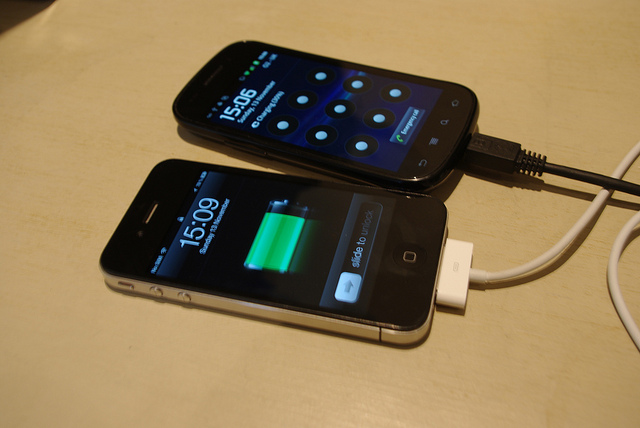Apple claims Samsung copied iPhone technology
California: An attorney for Apple told a jury that bitter rival Samsung faced two options to compete in the booming cellphone market after Steve Jobs introduced the iPhone to critical acclaim in 2007: Innovate or copy.
Samsung chose to copy, making its smartphones and computer tablets illegal knockoffs of Apple's popular products, attorney Harold McElhinny claimed.
Samsung "has copied the entire design and user experience" of Apple's iPhone and iPad, McElhinny told a jury during his opening statement at the patent trial involving the world's two largest makers of cellphones.
In his opening statement, Samsung attorney Charles Verhoeven countered that the South Korean company employs thousands of designers and spends billions of dollars on research and development to create new products.
"Samsung is not some copyist, some Johnny-come-lately doing knockoffs," he said.
Verhoeven asserted that Apple is like many other companies that use similar technology and designs to satisfy consumer demands for phones and other devices that play music and movies and take photographs.
For example, he said several other companies and inventors have filed patent applications for the rounded, rectangular shape associated with Apple products.
"Everyone is out there with that basic form factor," Verhoeven said. "There is nothing wrong with looking at what your competitors do and being inspired by them."
A verdict in Apple's favour could lead to banishment of Samsung's Galaxy products from the US market, said Mark A. Lemley, a professor and director of the Stanford Program in Law, Science, and Technology.
A verdict in Samsung's favour, especially if it prevails on its demands that Apple pay its asking price for certain transmission technology, could lead to higher-priced Apple products.
The witness lists of both sides are long on experts, engineers and designers and short on familiar names. Apple CEO Tim Cook is not scheduled to testify.
On Tuesday afternoon, Apple designer Christopher Stringer wrapped up the first day of testimony discussing his role in helping create the company's iPhone and iPod during his 17 years at the company.
Dressed in a tan suit, the bearded and long haired designer said because of Apple's desire to create original products, he and his co-workers surmounted numerous engineering problems such as working with the products' glass faces in producing both products over a number of years. Stringer said he was upset when he saw Samsung's Galaxy products enter the market.
"We've been ripped off, it's plain to see," Stringer said. "It's offensive."
Trial resumes Friday with the testimony of Apple senior vice president for marketing Philip Schiller.
Cupertino-based Apple Inc. filed its lawsuit against Samsung Electronics Co. last year and is demanding $2.5 billion in damages, an award that would dwarf the largest patent-related verdict to date.
The case marks the latest skirmish between the two companies over product designs. A similar trial began last week, and the two companies have been fighting in other courts in the United Kingdom and Germany.
In the patent case, U.S. District Judge Lucy Koh last month ordered Samsung to pull its Galaxy 10.1 computer tablet from the U.S. market pending the outcome of the patent trial. However, she barred Apple attorneys from telling jurors about the ban.
Apple lawyers argue there is almost no difference between Samsung products and its own, and that the South Korean company's internal documents show it copied Apple's iconic designs and its interface.
Samsung counter-claims that Apple copied its iPhone from Sony. In addition, Samsung alleges Apple is using some of Samsung's own inventions without payment, such as a computer chip at the heart of the iPhone.
Samsung lawyers also stressed the company has been developing mobile phones since 1991, long before Apple jumped into the market in 2007.
Also at issue at the trial are some of the most basic functions of today's smartphones and computer tablets, including scrolling with one finger and zooming with a finger tap.
Tuesday morning's proceedings began with a bit of drama.
First, a juror pleaded with the judge to be released from the trial, saying she suffered a panic attack and spent a sleepless night after belatedly discovering that her employer would not pay her salary while she served. A sympathetic judge granted her request and left the jury with nine members.
Then the judge rebuked John Quinn, one of Samsung's attorneys, for refusing to stop a line of legal argument the judge said she had ruled on numerous times.
"Mr. Quinn, don't make me sanction you," the judge said as the lawyer continued his argument. "Please. Please. Please, take a seat."
Quinn relented and sat down, but his tenacity underscored the high stakes of the trial that is costing both sides millions of dollars in legal fees and expenses. Battalions of lawyers from prestigious law firms are working overtime to file myriad court documents.
The most senior lawyers on each side charge upward of $500 an hour for their representation
Legal experts said that most patent disputes are resolved way before trials that can bring unpredictable and ruinous verdicts.
"A patent case of this magnitude has the possibility of impacting phone technology for years to come," said Manotti Jenkins, a patent attorney with no stake in the trial. "Given the substantial revenue that is generated by smartphone technology, companies are likely to prompt more litigation of this type and continue to use the courts as an attempt to protect and expand market share."







